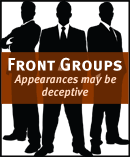No More Scares Campaign
|
This article is part of the Center for Media & Democracy's spotlight on front groups and corporate spin. |
The No More Scares campaign is a front group launched in August 2000 by a number of leading figures in the anti-environmental "sound science" movement, aiming to smear environmental and health activists as behind-the-scenes conspirators who "sow health scares to reap monetary rewards."
Contents
Early Days and "The Fear Profiteers"
The "No More Scares" campaign announced its formation at a Washington, DC press conference attacking Fenton Communications, one of the few public relations firms that represents environmental advocacy groups. No More Scares spokesman Steven Milloy used the press conference to release a report titled "The Fear Profiteers," which described Fenton as the "spider" at the center of a "tangled web of non-profit advocacy groups."
Inside PR, a public relations industry trade publication, termed the press conference "an unprecedented attack" and noted that "Steven Milloy and his colleagues . . . could scarcely have timed their tirade against Fenton Communications and the public interest groups it represents any worse. As Milloy and his cohorts accused consumer activists of provoking unnecessary alarm among the public, Ford and Bridgestone/Firestone were providing consumers with a stark reminder of the important role these self-appointed watchdogs perform as a necessary counterbalance to untrammeled corporate power and as a source of pressure on recalcitrant regulators. . . . Over the years consumer and environmental activists have done far more good than harm. Thanks to the work of those who agitate for social change, the roads have become safer; the environment has become cleaner; food has become more nutritious; consumers are in gen-eral far better informed about the products they buy; and workers are in general better rewarded and at less risk of injury or abuse."
Attack on Organic Food
In September, the No More Scares campaign unleashed a second salvo, this time aimed at organic food sellers. Titled "Organic Industry Groups Spread Fear for Profit," the report claimed to detail a "multi-decade marketing campaign by organic and natural products retail interests promoting false or misleading food safety and fear campaigns to promote organic product sales."
When it comes to deceptive scares involving organic foods, however, No More Scares seems to have a double standard. Alex Avery, one of the authors of the No More Scares report on organic foods, is the son of Dennis T. Avery, an "adjunct scholar" at the Hudson Institute and author of the anti-environmentalist tract, Saving the Planet with Pesticides and Plastic.
Like his son, Avery the senior claimed that organic food is actually more dangerous than foods grown using synthetic pesticides. Avery says that "people who eat organic and 'natural' foods are eight times as likely as the rest of the population to be attacked by a deadly new strain of E. coli bacteria (0157:H7)." This happens, he says, because organic food is grown in animal manure. He claims his data comes from the U.S. Centers for Disease Control (CDC), the federal agency that tracks outbreaks of foodborne illness.
In reality, organic food is no more likely to be grown in animal manure than nonorganic food. The CDC vigorously denies Avery's claim and has even gone to the unusual step of issuing a news release disavowing it. Nevertheless, Avery's message has been repeated in media op-ed pieces written by Avery with titles such as "Organic Foods Can Make You Sick" and in news stories by the Wall Street Journal, the Associated Press, and numerous other publications in the United States and Europe.
In February 2000, Avery was the featured expert for a 20/20 story by television reporter John Stossel which speculated that "buying organic could kill you." Stossel's piece made no mention of Avery's affiliation with the Hudson Institute, let alone any mention of the institute's corporate funding from agrichemical and agribusiness heavyweights including Monsanto, Du Pont, DowElanco, Sandoz, Ciba-Geigy, ConAgra, Cargill, and Procter & Gamble.
Principal Figures
Steven Milloy, columnist for Fox News and a paid advocate for Phillip Morris, ExxonMobil, and other corporations, is No More Scares' spokesman. Other principal figures with the campaign include Bonner Cohen, John Carlisle, Michael Fumento, Michael Gough, Henry Miller, Kenneth Smith and Elizabeth Whelan, all of whom have a track record of accepting funding from and defending industries that make dangerous products and pollute the environment. Many, including Milloy, have been outspoken apologists for the tobacco industry.
SourceWatch resources
Sources and references
- Sheldon Rampton and John Stauber, "The Usual Suspects: Industry Hacks Turn Fear on its Head," "PR Watch Newsletter," Third Quarter 2000, Volume 7, No. 3.
